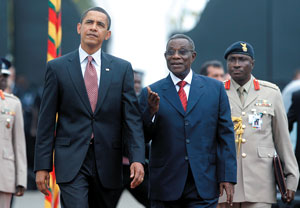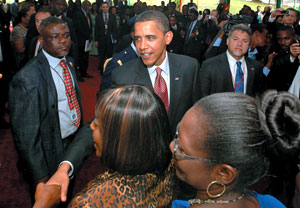Obama in Africa
By Richard B. MuhammadEditor-in-Chief | Last updated: Jul 16, 2009 - 8:09:54 PM
What's your opinion on this article?
Can U.S. president forge a newrelationship with the Motherland?Why the West hates African unity (The Herald, 07-14-2009)
Visit To Ghana: No Hidden Agenda - Obama (Daily Graphic, 07-2009)
Re-packaged AFRICOM still not good for Motherland (FCN, 07-01-209)
Docs expose U.S. role in first Ghanaian President Nkrumah 's Overthrow (Seeingblack.com)

U.S. President Barack Obama walks with Ghanaian President John Atta Mills at the Presidential Palace in Accra, Ghana, July 11.
|
If the American leader's visit leads to a shift in U.S. thinking and action, action that results in a policy that makes Africa a partner instead of a pawn, it could be the dawn of a new relationship between the Motherland and the world's sole superpower.
“I see Africa as a fundamental part, as partners with America, on the path to the future we want for all our children. That partnership must be grounded in mutual responsibility and mutual respect,” said Mr. Obama. The son of a Kenyan father and an American mother spoke to over 1,200 political leaders and guests July 11 at the International Conference Center in the center of Ghana's capital. The president called Africa to self-reliance and challenged the continent to overcome the problems of war, corruption, ethnic strife and dependence to forge a new destiny.
“We must start from the simple premise that Africa's future is up to Africans,” he said to members of Ghana's Parliament, the primary audience.

Pres. Obama greets guests at the Presidential Palace in Accra, Ghana, July 11. In his fi rst visit to sub-
Saharan Africa since taking offi ce, Pres. Obama is seeking to lift up the continent of his ancestors.
|
Mr. Obama spent less than 24 hours in this West African nation. But from his night time arrival to drummers and dancers greeting him and enthusiastic, camera flashing guests on the tarmac when he left, the trip was power packed. He landed on a Friday evening and was escorted to a private dinner. The next morning there was a breakfast at the Castle, the seat of Ghana's government, a tour of a clinic, the address to lawmakers, then a quick helicopter flight to the Cape Coast Region to tour a slave castle. Mr. Obama, First Lady Michelle Obama, and children Sasha and Malia walked the grounds of the place where likely millions of Africans were held before slave traders shipped the human cargo to the West. By Saturday evening the first family was onboard Air Force One and headed back to Washington, D.C.
With President John Atta Mills of Ghana, members of Parliament, military officials and special guests in the audience, Mr. Obama stressed good governance goes hand in hand with a vibrant democracy, social and economic progress. “The continent is rich in natural resources. And from cell phone entrepreneurs to small farmers, Africans have shown the capacity and commitment to create their own opportunities. But old habits must also be broken. Dependence on commodities—or on a single export—concentrates wealth in the hands of the few and leaves people too vulnerable to downturns,” he said.
Ghana was the site of the president's first trip to sub-Saharan Africa. The country has a long history of Pan African thought and sentiment. Its first president, Dr. Kwame Nkrumah, was educated in the United States and envisioned a United Africa. When British rule here ended 52 years ago, Black Americans were helping Dr. Nkrumah develop the country. After harassment by the U.S. government, Black scholar W.E.B. DuBois lived and died in Ghana. He is buried at a center named in his honor in Accra.
U.S. will support responsible governments
“America will not seek to impose any system of government on any other nation— the essential truth of democracy is that each nation determines its own destiny. What we will do is increase assistance for responsible individuals and institutions, with a focus on supporting good governance—on parliaments, which check abuses of power and ensure that opposition voices are heard; on the rule of law, which ensures the equal administration of justice; on civic participation, so that young people get involved; and on concrete solutions to corruption like forensic accounting, automating services, strengthening hot lines and protecting whistle-blowers to advance transparency and accountability,” Mr. Obama said.

A man adjusts antenna to television set to watch Pres. Obama’s arrival. Photos: Richard B. Muhammad
|
While Mr. Obama challenged Africa to shake off bad habits, the tone of his visit and Ghana's response was one of optimism and opportunity. Using his trademark “Yes We Can” mantra, the overall Obama message focused on responsibility and new possibilities.
“You have the power to hold your leaders accountable and to build institutions that serve the people. You can serve in your communities and harness your energy and education to create new wealth and build new connections to the world. You can conquer disease, end conflicts and make change from the bottom up. You can do that. Yes you can. Because in this moment, history is on the move,” Mr. Obama said, in words directed at Africa's young people.
“But these things can only be done if you take responsibility for your future. It won't be easy. It will take time and effort. There will be suffering and setbacks. But I can promise you this: America will be with you. As a partner. As a friend. Opportunity won't come from any other place, though —it must come from the decisions that you make, the things that you do, and the hope that you hold in your hearts.
“Freedom is your inheritance. Now, it is your responsibility to build upon freedom's foundation. And if you do, we will look back years from now to places like Accra and say that this was the time when the promise was realized—this was the moment when prosperity was forged; pain was overcome; and a new era of progress began,” he said.
Mr. Obama acknowledged the harm colonialism and paternalism did to the continent, but argued other problems—like corruption, rape as a weapon of war and the use of child soldiers—were self-inflicted wounds. Africa must move forward into the 21st century and blaming shortcomings on yesterday's injustices won't bring progress, he said.
President Obama touted Africa's potential as a source of renewable energy— whether biofuel or solar generated—and her potential as a young continent. He announced a $63 billion commitment to fight diseases like malaria, polio and tuberculosis and support public health systems that serve mothers and children. Another $3.5 billion will go to a food security initiative focused on new farming methods and technology for Africa, he added.
But despite the optimism, there were voices that questioned whether Mr. Obama could change U.S. policy from paternal and exploitive domination to equal partnership.
Part of the discussion was fueled not only by the general exploitation of Africa, but also by the United States and CIA role in the overthrow of Pan Africanist visionary Dr. Nkrumah in 1966. Analysts accepted Mr. Obama's sincerity but debated whether the United States—with its no permanent friends or enemies, just permanent interests philosophy—would be willing to change. Some expressed concern for Mr. Obama's safety should he move too far away from the manipulation and exploitation of Africa.
“A leopard does not change its spots,” warned Dr. Hamet Maulana, during a program broadcast from Vibe FM radio in Accra's Pyramid Building. Host Kwaku Horford moderated the discussion as Dr. Maulana, A. Akbar Muhammad of the Nation of Islam and “Africa and the World” columnist, Timothy Ihemadu of the Nigeria- based International Organization for Sustainable Development, analyst Ibrahim Adjei and G.A. Pele, Ph.D., of Pelgha University in Accra, explored “The Real Visit Behind the Visit of President Obama.”
The West is falling politically, spiritually and economically, Dr. Maulana said. In a quest for survival, Western powers want to again exploit Africa, warned Dr. Maulana, of the African World Reparations and Repatriation Truth Commission. The problems on the continent were caused by Europeans and interactions with Europeans, who tout democracy as their democracies fail, he added.
The panelists agreed that Ghana and Africa needed self-sufficiency to thrive, not only in trade with the West, but in intra- African trade. Mr. Adjei argued that the vision of a United Africa put forth by Dr. Nkrumah was essential to the success of Ghana and the entire continent.
Akbar Muhammad, who noted that Mr. Obama mentioned the African Union in his speech, urged giving the U.S. president a chance. He also urged Ghana to take immediate advantage of the interest the world would have in seeing the places Mr. Obama visited. Ghana must prepare for a tourism boom, he said. “It is a once in a lifetime opportunity,” Akbar Muhammad said.
Dr. Leonard Jeffries, a leading Black studies scholar, told The Final Call in an interview that U.S. policy toward Africa has always been abusive and Blacks in America must push for changes.
“We have to have an African policy that African Americans fi ght for that is for Africans. Traditionally our policy has been for the corporate structure, the global giants that find their way in Africa and are sucking up the minerals of Africa and their resources and not adequately paying for them, or compensating Africans for this rape of Africa. So the rape of our population went on for 400 years and since the end of enslavement, the rape of the resources has continued unabated. African Americans have a responsibility to fight for a fair policy,” he said.
Related links:
Why the West hates African unity (The Herald, 07-14-2009)
Re-packaged AFRICOM still not good for Motherland (FCN, 07-01-2009)
The exploitation of Africa’s land and people (FCN, 02-24-2009)
The Birth of the African Union (FCN, Minister Louis Farrakhan, 07-24-2001)
Documents Expose U.S. Role in first Ghanaian President Nkrumah 's Overthrow (Seeingblack.com)
INSIDE STORIES AND REVIEWS
-
-
About Harriett ... and the Negro Hollywood Road Show
By Rabiah Muhammad, Guest Columnist » Full Story -
Skepticism greets Jay-Z, NFL talk of inspiring change
By Bryan 18X Crawford and Richard B. Muhammad The Final Call Newspaper @TheFinalCall » Full Story -
The painful problem of Black girls and suicide
By Charlene Muhammad -National Correspondent- » Full Story -
Exploitation of Innocence - Report: Perceptions, policies hurting Black girls
By Charlene Muhammad -National Correspondent- » Full Story -
Big Ballin: Big ideas fuel a father’s Big Baller Brand and brash business sense
By Bryan Crawford -Contributing Writer- » Full Story






 Click Here Stay Connected!
Click Here Stay Connected!








